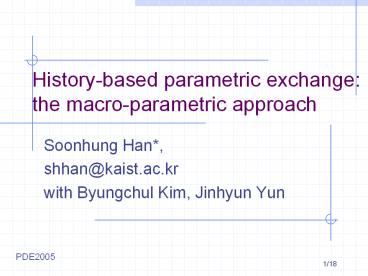History-based parametric exchange: the macro-parametric approach - PowerPoint PPT Presentation
Title:
History-based parametric exchange: the macro-parametric approach
Description:
History-based parametric exchange: the macro-parametric approach Soonhung Han*, shhan_at_kaist.ac.kr with Byungchul Kim, Jinhyun Yun PDE2005 – PowerPoint PPT presentation
Number of Views:122
Avg rating:3.0/5.0
Title: History-based parametric exchange: the macro-parametric approach
1
History-based parametric exchange the
macro-parametric approach
- Soonhung Han,
- shhan_at_kaist.ac.kr
- with Byungchul Kim, Jinhyun Yun
PDE2005
2
Korea
Chin
China
Seoul
Daejeon
Japan
3
Outline
- ISO/TC184/SC4/Parmaterics Group
- Problem of current STEP AP203 on shape exchange
- History-based (procedural) parametrics
- Macro-parametric approach
- Persistent naming
4
Current STEP Transfer of Shape Models
- B-rep model is transferred. A snapshot of an
evolving model - Missing data
- constructional history of the model
- parameterization (design freedom)
- geometric constraints (design restraint)
- design features (high-level shape design
constructs with possible links to functionality) - This data is referred to as design intent.
Without it, the transferred model cannot be
parametrically edited after transfer dumb
model.
5
Procedural and explicit representations
- d4 Nf6
- c4 e6
- Nc3 Bb4
- Nf3 0-0
- Bg5 c5
- e3 cxd4
- exd4 h6
- Bh4 d5
- Rc1 dxc4
- Bxc4 Nc6
- 0-0 Be7
- Re1 b6
- a3 Bb7
- Bg3 Rc8
- Ba2 Bd6
- d5 Nxd5
- Nxd5 Bxg3
- hxg3 exd5
- Bxd5 Qf6
Explicit current model
6
Activities in ISO
- Part 55 Procedural and hybrid representation
- Part 108 Parameterization and constraints for
explicit geometric product modelling - Part 109 Enhanced assembly modelling with
parameterization and constraints - Part 111 Construction history features
- Part 112 Constructional history of 2D sketches
- AP 203 edition 2 and the CHAPS project of
PDES/ATI
7
Parametrics Group of ISO
- ISO/TC184/SC4/WG12/Parametric Group
- Michael Pratt (LMR Systems NIST)
- Noel Christensen (Honeywell), Rachuri Sudarsan
(NIST), Bill Anderson (ATI), Ray Goult (LMR
Systems), Tony Ranger (Theorem Solutions),
Akihiko Ohtaka (Nihon Unisys), Nobuhiro Sugimura
(Osaka Prefecture Univ),
8
Related works outside SC4
- OMG CAD Services
- Purdue EREP (Editable Representation)
- CAM-I Application Interface Specification (AIS)
Standard API - DMAC OLE for Design and Modeling
- Djinn of UK
9
Motivation of macro-parametric
- Crash recovery in a DBMS Transaction log file
- SQL (structured query language)
- MQL (modeling query language) ?
- Macro file History of user commands
10
Modeling history
- Sequence of modeling commands
- Log file, macro file, journal file, script file
- Regeneration of model inside the receiving CAD
system
11
Neutral modeling commands
Pro/E
CATIA
UG
common set
IDEAS
SolidWorks
12
Implementation and tests
13
Implementation team of KAIST
A
FEM (I.H. Song)
IDEAS (Ananda)
SKETCH (P.W. Hur)
TransCAD (B.C. Kim)
M
CATIA (S.U. Cheon)
Persistent Naming (D.H. Mun)
A
UG pre (H.K. Lee)
A
A
Inventor M.H. Cha
A
UG post (J.S. Hwang)
SW API (Erkan)
14
(No Transcript)
15
Extrusion feature
Horizontal slot
Vertical slot
Vertical slot depth change 20 ? through all
Fillet feature
Re-evaluation
Persistent naming problem in SolidWorks
16
ISO Standardization of P112
- ISO10303-112 Sketch Parametric
- SC4/WG12 N2478 2003-10-28 WD
- Start of CD ballot (December 1, 2004)
- End of CD ballot (April 1, 2005)
- Scheduled Stage 4 DIS 2005-12-01
- Scheduled Stage 5 FDIS 2006-03-01
- Scheduled Stage 6 IS 2006-09-01
17
Future
- Integration of persistent naming module
- Semantic interoperability based on ontology
- Collaboration (CSCW) sending message (command)
rather than heavy B-rep model
18
Thanks
19
Why use a dual model?B-rep and procedural models
have different, complementary characteristics
- Procedural
- No geometry just operations! No good for
downstream applications - Relative positioning hard
- Parameterization easy
- Attribute association hard
- Concise
- Robust
- B-rep
- Provides explicit geometry for applications
(e.g., visualization, NC machining) - Relative positioning easy
- Parameterization hard
- Attribute association easy
- Verbose
- Delicate
20
Integration of translators
Additional modules
Pro/Engineer Translator
CATIA Translator
TransCAD
Automation APIs
Std. Macro File (XML)
SolidWorks Translator
Geometric Kernel XML Parser Persistent Naming
UG Translator
21
Test cases of CHAPS project
CHAPS No.1
CHAPS No.2
CHAPS No.3
CHAPS No.6
CHAPS No.5
CHAPS No.4
CAD files (CATIA Pro/Engineer) Modeling
history Construction History and ParametricS,
ATI, 2004
22
(1) Persistent naming
Basic naming
(1.1) Naming
Creation
(1.1.1) Basic naming
Solving ambiguity
(1.1.2) Solving ambiguity
(1.2) Name matching
Name matching
(2) Naming mapping
Modification
Final design model
Taxonomy of persistent naming problem































